- From Faith Current: “The Sacred Ordinary: St. Peter’s Church Hall” - May 1, 2023
- A brief (?) hiatus - April 22, 2023
- Something Happened - March 6, 2023
Forgive me if this post is a bit hasty—I sat down to write my parody Downturn Abbey, which I’m doing for St. Martin’s on a brain-busting turnaround, but…I was in the middle of replying to Craig’s nice comment on the previous post, and an issue occurred to me, one probably pretty central to this blog yet something I don’t recall us ever discussing. It’s this: What do you think about Beatles bootlegs? Do you collect them? Do you feel kinda bad about listening to “illegal” recordings?
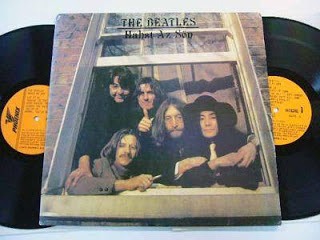 |
| A major find. |
I collected Beatles bootlegs pretty obsessively from 12-16. I would head to the same stores where I’d find old underground comix and copies of National Lampoon and, o frabjous day!, find Hahst Az Son or Strawberry Fields Forever squirrelling in the racks. Living in Chicago, I got to go to Beatlefest, and there I’d load up further—though one must remember how little there was to collect back in 1981-1985, mostly Let It Be-sessions stuff, which I loathe (but I love Dan’s site), and BBC stuff in execrable quality. Just when I’d had enough of $30 LPs that sounded horrible, something new would trickle out, part of the Barrett tapes, or (one of the happiest days of my young life) Sessions. Though I haven’t listened to them in decades, my vinyl Beatlegs are still some of my most evocative possessions. And I still believe my 3-LP set of The Beatles at the BEEB will be worth a fortune someday. 🙂
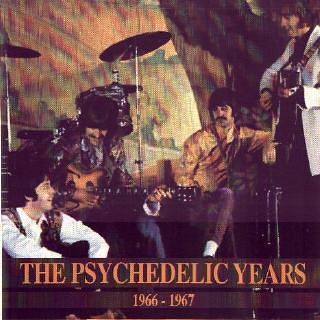 |
| My antidepressant of choice. |
Then I went away to college and my Beatlefan tendencies waned; that’s why Ed never knew I liked The Beatles until 2004 or whenever Dullblog started. It was only after I’d moved back to Chicago in 2001 and returned to my old record shops that I discovered all the great stuff that had come out in the years since. Tracks that, capitalism be praised!, had pressured Apple into finally getting off the dime re: Anthology—the Great Dane set, Vigotone, Artifacts…That got me back in for a while, hoovering up all the tracks I’d dreamed of as a kid. One Christmas, Kate gave me a subscription to a site in Bolivia or someplace, where some enterprising person had uploaded his massive collection. That was fun.
Beatles Bootlegs = Mafia?
But I stopped collecting Beatlegs years ago, not only because there is only so much to collect—also because I never liked not knowing where the money was going (organized crime?) and knowing for sure that none of it was going to J, P, G, or R. And also because my own relationship with copyright is, shall we say, complex. Not only because I am best known as a parodist—a completely “white hat” practice by the way, even though people don’t realize it—but also because I’ve probably lost a million book sales to piracy over the years. Karmic payback? Perhaps, George, perhaps.
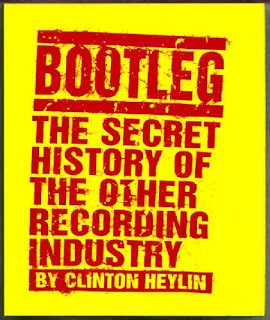 |
| Fascinating book—anybody know any better ones? |
So how have I justified listening to Beatlegs? First, because none of The Beatles, their heirs or assigns, are in financial difficulty. They’ve all been extremely well-compensated for their work and genius, and will continue to be. I’ve already purchased the licensed catalog, some of them several times in several formats, and so have you. Not only is the Lennon estate is not materially injured by my streaming “Dakota Beatle” songs on Youtube, the more Lennon inhabits my consciousness, the more likely it is that I will buy yet more licensed product. Second, the historian in me wants to get as close to the source as possible, and unofficial recordings are currently the only way to do that. This issue will become really quite important after Paul and Ringo die, and custody devolves to heirs.
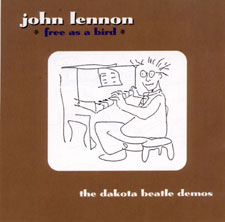 |
| As important a source as any bio. |
So even though I don’t collect any more, if some major, fascinating work is discovered and turns up online, I’d certainly try to hear it, and push for it to be released legitimately. I think Apple is finally getting this; now that I can get a remaster mono Pepper from Apple, I don’t need the digipak I bought in the Village in 2003. There is a thrill in hearing “secret” Beatles tracks, but particularly as I get older, I think it extremely important that as much Beatle material as possible be freely available to scholars. Because of its historical impact, not to mention its quality, Beatle music should be seen as part of the world’s heritage. It needs to be released, in toto, without any “jiggery-pokery,” and put under the care of trained professionals overseeing a foundation somewhat like the Folger Library.
What does everybody else think? While you’re pondering, you can listen to Take 1 of “Free As a Bird.”

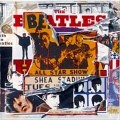
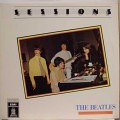

Alrighty, glad I could inspire a post, Michael. Great topic. I have a few thoughts, mostly echoing what you already stated. I really don’t feel bad about purchasing bootlegs. One reason is that I’ve spent countless money on official Apple products, so I’ve heaftily contributed to the Beatle bank account. If I had never purchased any official Apple merch, this would be another story. Another reason: the more Beatle product out there, the better, in my opinion. It only increases the possibility that someone will buy official product if they’ve started to get into the bootleg market.
This being said, like I mentioned in the previous post, I don’t have any Beatlegs. Where can I go to download some or purchase some? And what should I start out with? Any thoughts Apple Scruffs?
-Craig
I can’t cast a vote because I haven’t collected em but have no moral objection to them. I’m blogging through all 211 songs and having even more versions would just make it more complicated. Even sorting through Let It Be and Naked and Past Masters and Anthology 3 is driving me nuts.
I am thankful for being able to check out the odd different version via What Goes On: Beatles Anomalies website and YouTube but not so much. (my interest is in songwriting rather than recording per se).
Anyway – thought you did a good job balancing out the pros and cons. Another thing to throw in there is that George and John make no money from legitimate sales now (obviously) – Olivia and Yoko receive their shares in entirety. It’s worth reflecting that Olivia had no role in supporting George while he was creating the music the Beatles songs that she gets royalties for and in Yoko’s case you could say she’s receiving financial reward from something she helped to destroy …
Really disagree and don’t like what Matt is saying there with his last few sentences. George and John chose to spend their lives and share their love with their respective wives. They obviously thought highly enough of them to leave most of their will’s to them. Are you saying they don’t deserve Beatle money? John/George chose them, that’s good enough for me. It’s not like they had to sue the estates to get into the will. Olivia supported and stayed with George for over 20 years and we all know he wasn’t the perfect husband. I don’t agree with your sentiment on Yoko destroying the group, but that’s for another time. Many would say, including me, that she helped save Johns life in the late 60s. Also, it seems like these women, especially Yoko, spend the majority of their time helping to preserve and protect their husbands legacies.
More power to them.
-Craig
The Beatles and their heirs have gotten enough of my money over the years. I bought sgt. pepper in 1967 as a mono LP, in 1974 I bought the stereo LP, in 1985 I bought it on CD, etc.
My only complaint with the beatlegs is the absolutely shitty quality. It wasn’t until very recently (like last week) that I heard a version of “Not Guilty” (on youtube) that didn’t sound like absolute dogshit because of the poor beatleg recording quality.
I collected beatlegs in the 1970s and finally stopped because I got tired of the poor quality. I’ve more than made up for it by purchasing “legit” box sets of Lennon, plus all the other legit stuff.
Can’t wait for Downturn Abbey!!
Thanks, Ed! It’s rocking along pretty good–as you know, I’m fascinated by the Edwardian, WWI and 20s periods, so I’m having a ball. Think people will really enjoy it.
I’m serious about the walk-on contest. I did it for charity with Barry 2, and it was great fun for everybody.
My feelings about Beatlegging are uncomplicatedly all-in-favor-of, for all the good reasons Michael has articulated and to which I have none to add. Though I’d say that the keyest of key reasons is that those who buy bootlegs are almost invariably going to be the same people who buy EVERYTHING the artist offers for legitimate sale as well.
As for where the money goes, you have that conundrum even with above-board purchases; perhaps more so, given the illicit doings well-known conglomerates can get into. Did those who paid for ITT products and services in the early 1970s know part of their money was being used to fund the overthrow of Allende? How do we feel about our iProducts in light of the Apple factory scandals recently revealed in China? Bootlegging is small peanuts in comparison.
Oh, and I’m looking forward to your Abbey parody too, Mike (though I have to familiarize myself with your target to appreciate it!).
Devin, I think you sent me a partial document once–could you resend it, sometime? What I’d like to do someday is use your list to craft a Dullblog listener’s guide or something. Go through it, item by item, linking to each track on Youtube, and getting comments from everybody. Wouldn’t that be fun?
Meanwhile, time spent with Downton Abbey will be time well-spent. I’ll throw in some Beatle clues for my Dullblog peeps: “The new valet was in every way mean, moody, and magnificent.” 🙂
Any updates on the best of Beatle boots, or th best place to get them?
BTW, I just watched a 70’s episode of SNL in which George is the musical guest. Great stuff. It includes a couple music videos, one of which is Crackerbox Palace. Those of you with Netflix can enjoy as well…
-Craig
Hello, it’s me again, Craig. Sorry for the double post here…but I had to ask something. I just saw read that George’s Swiss mansion is up for sale and it reminded me of something I read that I’ve never been able to confirm. I forget which book it was in, but it maintained that George was in financial straights in the early 90’s and because of this, he finally relented to do the Anthology. I’ve never read about this anywhere else though. Any thoughts?
-Craig
Do we (we, as in, knowledgable Beatles literati) buy the John/Yoko perfect marriage in the late 70’s, or the more Goldman centered two junkies living separate lives ready to divorce story? I’m torn. I’m thinking it’s somewhere in the middle. Will Yoko ever come clean? I guess we know the answer to that already. It’s something that really nags at me because it’s not like there is one central story that slightly differs at parts, it’s two completely different stories that are being sold. Where is the truth??
A few quick thoughts: on best boots, look for “Revolving,” which compiles outtakes and alternate mixes from the Revolver sessions. So much better than the loads of stuff from the “Get Back”/”Let it Be” era.
I can’t feel guilty about enjoying beatlegs because, as Michael also ays, I’m not buying them in place of legitimate releases. I see a big difference between piracy (buying something that’s copied from a legitimate release) and bootlegs in the unreleased sense.
Craig, to your question about George’s financial difficulties: here’s an article in the Independent that says his participation in the Anthology project was spurred in part by money troubles arising from his company Handmade films: http://www.independent.co.uk/life-style/money-thats-what-i-want-1579802.html
And Anon, about John/Yoko marriage: somewhere in the middle, I think. Just where, who can say?
Anon, I spent about three years off-and-on trying to figure out where reality was regarding J&Y’s marriage, as part of a comic novel I was doing. I am sorry to report that I didn’t come to any strong conclusion except that both appeared to be extremely difficult people to be married to, and that money and posses tend to exacerbate the normal ups-and-downs of any marriage.
While we know a ton–perhaps too much–about John, we know very, very little about Yoko, and while his personality seems to have been one of oversharing, Yoko is exactly the opposite. The sources we do have on her are full of flaws–the Goldman book, the Esquire profile from 1971; worse still, she seems to be actively accumulating as much primary source material as she can before her death, which will make the possibility of a truly even-handed bio that much more unlikely.
The question of J&Y’s marriage is like the question of Yoko’s role in the breakup: it immediately devolves into questions of personality–“Yoko’s a genius” “Yoko’s a user”–and ultimately that’s going to rob us of a clear picture. These are weird people, formed by weird circumstances in weird ways. I, too, sense that the media creations, positive and negative, have very little to do with the reality.
Michael, I think any good bio of Yoko will have to be interpretive, correlating her work with the outline of events in her life and using the work as a primary lens through which to see her. This this is the same as what we said on this site earlier about what would be required of a good bio of McCartney is interesting.
Lennon said he had only worked as a full artistic partner with Paul and Yoko, so it’s not so surprising they have some similar traits: strong (verging on controlling) personalities, desire for privacy/control of personal information, love for/exasperation with John . . . .
Of course Paul and Yoko also have MANY differences. Not sure we’ll ever get a completely rounded view of either of them, though, because neither of them seems to want us to get one. Can’t say that I blame them, either, given what each has been through.
Thanks for the replies, Nancy and Michael. Actually, I’m the anonymous who posted at 12:56pm – Craig. Thanks Nancy, I’ll check out “Revolving.”
I skimmed Goldmans book a few years ago, mainly just the final hundred or so pages, at the library. But I never read the whole thing, which I have just begun to undertake. I’m only about 150 pages in at the moment, and I have to admit, I think he is a fairly good writer. I know this book has a pretty horrible reputation, but there is definitely some good information being relayed. Michael, should I be wary of anything in particular within this book? It does seem like much of the time he is simply writing a novel, but that is always a good sign for a well written bio in my opinion. He paints a very illuminating and descriptive picture of Mimi and for why John turned out the way he did.
Again, thanks for the replies. I love being able to have an intelligent dialogue with others who undoubtedly know more than I do.
-Craig
Craig, that’s the thing about Goldman–he’s undoubtedly a very good writer; I happen to think he’s a GREAT writer, but I have a serious weakness for the New Journalism. I haven’t read “Elvis,” but I have read Goldman’s bios on Lenny Bruce and Lennon, and I think both shed considerable light on their subjects–and precisely the kind of light that can only be shed if a biographer is going to GO THERE. Modern celebrity culture is horribly destructive; it is a kind of psychic prostitution which panders to the lowest instincts of all concerned.
Here’s what I would keep in mind as you read: nothing that Goldman says can touch what is truly important about John Lennon: his music, and what he meant to the people of his era. Goldman’s book is an attack on the myth, and it’s quite valuable as that–not just the Lennon myth, but The Beatles’ myth, the showbiz myth, the artist myth, the capitalist myth. Let it shake your certainty in all those things, and you will probably find a deeper, truer, more personal connection to John Lennon–if that’s what you want. Because if there’s one thing that’s clear about Lennon, it’s that he went through cycles of faith and disillusionment. Let yourself go through that about him, and you’ll understand him better.
There’s a Buddhist saying: “When you meet the Buddha on the road, kill him.” This can be interpreted as whatever you attach to, release from it, and keep observing. Most Beatles fans have an idea of who John Lennon was. Whatever that is, he wasn’t that. He was simply himself. One can read about him, be interested in him, look at his life for examples of wisdom and folly–but he wasn’t what you (or I) think he was. He was just himself.
He certainly wasn’t his media image. Goldman said many times in interviews that he truly believed the media image of Lennon before starting the book, and was shocked to find out that it was untrue. I think this explains the venom in the book; it’s the same venom one sees all over the internet, where “hypocrisy” is the ultimate sin. Of course this is an overreaction; Lennon didn’t owe us anything, and if he (and Yoko) snowed us with their various raps, that’s a shame, but perhaps its time we stopped looking for parent-figures in celebrities. To the degree that Lennon “preached” that, I think he was wise; to the degree that he and Yoko seemed to want to direct and control “the little people” (which is more prominent in her personality than his), I think it’s the same old aristocratic bullshit, only with money and fame rather than an ancient hoary title.
Use Goldman to let Lennon out of the trap we’ve created for him, as fans. Then believe what rings true to you, and disbelieve what doesn’t. Now apply that same technique to the mythmakers, Yoko and Wenner and all those guys. The truth–your personal, little truth about John Lennon–will emerge. I’ve found the process helpful and instructive.
Michael, your last few sentences really resonated. It’s something I’ve been doing now for a couple of years: the filtering of info and believing what you choose to believe because it sounds the most reasonable with what you’ve lready learned.
My family/friends always ask me why I’m reading (MORE!?) Beatles books. Surely, I must know their story by now, they say. Well, yes, yes I do. I’m not reading for the chronological timeline (Hamburg, Cavern, Epstein, Martin …etc) that is undoubtedly a part of every Beatle book. Although, I have to admit, I still enjoy reading about the early years, no matter how many times I’ve read about them before. At this point, I’m reading for the anecdotes, for the brief quotes by an acquaintance that has never been interviewed before, for another authors opinion on just what made the Beatles go go go. After completing yet another bio, I take away what I think is important, and thus help form and complete my overall feelings about the group. Sorry for the tangent!
Ok, back to the Goldman book…
Ps. Anyone else ever get carried away thinking about what kind of a life Stu would have lived? I used to think that he was probably a good artist who’s reputation became almost legendary bc of his association with the Fabs. However, it seems he was quite superior to just “very good.” Just think of all the projects Stu and the Beatles would have been a part of in the ’60s. Such a shame, really. John must truly have felt that he was living a cursed life.
-Craig
I strongly recommend Goldman’s first bio of ELVIS. His portrayal of Tom Parker is laugh out loud funny. It’s a brutal book, but as good as his Lenny Bruce bio.
Goldman’s description of Elvis’s meeting with the Beatles, and later with Nixon, is worth the price of admission.
Anyone else ever get carried away thinking about what kind of a life Stu would have lived?
I’ve often wondered myself. He probably would have created the Revolver album cover artwork. Possibly he would have become the Beatles official artist, designed album covers.
Stu’s brief life really brings home how much risk the Beatles faced in Hamburg. With all the “acting out” that Lennon did, insulting the locals, it could have easily been him getting kicked in the head.
Do we (we, as in, knowledgable Beatles literati) buy the John/Yoko perfect marriage in the late 70’s, or the more Goldman centered two junkies living separate lives ready to divorce story? I’m torn. I’m thinking it’s somewhere in the middle. Will Yoko ever come clean? I guess we know the answer to that already. It’s something that really nags at me because it’s not like there is one central story that slightly differs at parts, it’s two completely different stories that are being sold. Where is the truth??
I confess I used to buy into the myth, taking John’s statements as fact. The more I read, the more I doubted the official line. It’s possible, in my opinion, that Lennon might have split sometime in the ’80s, but here’s what I see as a major obstacle: his pride.
Here’s what I mean. He and Yoko took so much real and imagined abuse from the press, from the music industry, from the other Beatles. For Lennon to end the marriage, he would essentially be admitting “Hey, you guys were right. I don’t know what I was thinking.” He might have felt he would have lost respect from the others, after being so militant in his relationship with her. I think the more crap John took about being with Yoko, the more determined he became to call her a genius, the love of his life. To do anything less would be to admit defeat.
Anon, I think you’re onto something.
Thanks for the responses, various anons…
Although, I disagree with anon 1:56 about Stu. I think the kicked in the head theory is bull. Many young people die every year from cerebral hemorrhages. Also, there is no documented story of him being specifically kicked in the head. To my knowledge, none of the Beatles specifically remember seeing Stu get a boot to the skull. Additionally, the story of him getting in a fight and receiving a fatal kick to the head while a member of The Beatles is a much sexier story than a congenital health defect that eventually felled the unfortunate lad.
Anon 2:41, very salient point about John’s pride with regards to Yoko. The deeper I am getting into Goldmans book, the more I’m learning about Yoko. Yes, I’m taking everything Goldman says with a large chunk of salt. That being said, her life story from 1950-1967 is simply remarkable. What I mean in remarkable is that there is just nobody else like her. She is so difficult to understand. You never really get a true sense of her motives. She just baffles me. I’m not really sure where I’m going with this, just thought I’d voice my thoughts.
Anyways, I think you could be correct, anon. Giving up marriage/Yoko would have been extremely difficult for John, given all they went through together.
-Craig
“What I mean in remarkable is that there is just nobody else like her. She is so difficult to understand. You never really get a true sense of her motives. She just baffles me. “
A lot of people think the same thing about Paul McCartney. I don’t think it’s any coincidence that John was drawn to two such strong yet puzzling individuals as Yoko and Paul. And maybe the reason the two of them never quite got along. They’re too much alike!
— Drew
Well I should have read the thread more thoroughly because I see nancy already made the point about Paul and Yoko being very much alike in certain ways. I should have known!
At any rate, I think the Stu myth is as inaccurate as the myth about John and Yoko’s marriage. Certain people seem to have a big stage in exaggerating Stu’s importance in the band. I just read recently in Uncut magazine that Mersey Beat editor Bill Harry said that John and Stu’s relationship prior to Stu joining the band had been completely exaggerated, that there was no special closeness and that John and Paul just wanted a bass player and they were considering a range of choices, including Stu.
I don’t doubt Stu was a good artist. But there’s no evidence he was great, no evidence that he was doing anything original. Like I said, there’s a small cottage industry that needs to overblow his importance. It sells books and art, doesn’t it?
And I think the March 24 anon is right on the money. John would have held on to Yoko as long as possible as a point of pride. He had already lost the lawsuit with Paul over the Beatles, he’d already had to break it off with Klein and publicly admit Klein was a mistake, I can see him fighting tooth and nail to avoid having to admit — in the face of Paul’s happy marriage — that John and Yoko weren’t the love story of the century.
— Drew
Anon, there’s something to your point–Paul and Yoko both seem to be similar in some ways. But there’s an essential difference between them as artists.
McCartney’s work is designed to be popular. He wants you to love him, and gives you what he thinks you’ll like. This is what’s made him so great, and also what drives people crazy about him–what makes people thinks he’s shallow and/or fake. But one interacts with McCartney’s work as at least an equal. Ono’s work is designed to be UNpopular–she’s a product of an era/ethos that put the artist above the audience; so one interacts with Ono’s work as a pupil.
Paul wants to entertain you, and Yoko wants to instruct you. She’s a secular guru, dispensing koans–which is exactly how John perceived her, and insisted that the world treat her. And his outrage was the outrage of an acolyte, a worshipper.
This change from secular to spiritual explains why there is so much negativity focused on Yoko Ono–it’s not that she’s Asian, or weird, or a woman–it’s that she has combined the “hipper-than-thou” commercial bitchiness of the NYC art scene with a spiritual message that has not been reflected in her life choices. That’s annoying in an entertainer; it’s worse in a guru. People judge Ono more harshly, and they probably should, because she claims a special kind of authority. I have hope for her–that she really will embrace the higher consciousness that she seems fascinated with–but the first step to that would be stepping away from getting and spending, and that’s very, very tough. (Ask George.)
So Anon, I think Paul and Yoko aren’t the same personality, but two very smart people who, as children, picked different strategies to gain the financial stability that they craved. Paul’s strategy has been people-pleasing; Yoko’s has been a kind of quasi-religious imperiousness. Both have succeeded to an extraordinary degree, but each has flaws that produce a specific kind of backlash.
Anyway, just an opinion on a Sunday morning. God bless ’em both.
Well, those are some complicated feelings about Beatlegs indeed. Just kidding, of course. It’s been a fascinating discussion… as always on this blog!
Anyway, I thank the gods and/or goddesses or whomever is responsible for all things wonderful and virtuous for the many years of Beatlegs. I’m not exactly a collector, though I purchased some vinyl last century at the Capitol Records Sunday morning parking lot sales and my iTunes library is sprinkled with some downloaded Purple Chick and the like. The ‘legs have given me valuable insight into songwriting genius and have helped deepen my already profound love of all things Fab.
And John was cool with them. That’s good enough for me.
“Both have succeeded to an extraordinary degree”
In what way has Yoko succeeded to an extraordinary degree?? She married John and inherited his fortune? I guess that’s succeeding. Her “music” is mostly universally hated. Her “art” has mostly been proven to be copied from what more talented artists did before her.
I’m almost offended that you would compare Yoko’s success to Paul. I’m not even going to list what Paul has accomplished because I know you are fully aware. Yes, Yoko was not out to create pop music, but I ask again, what has she succeeded at in her life to an EXTRAORDINARY DEGREE? She’s done some amusing arty things throughout her life, promoting peace which is highly admirable yet not original. She’s a very good self promoter, as is Paul, but Yoko has nothing to promote.
Explain yourself, Mike!
Cheers
-Craig
Craig, what I meant was, “both have succeeded to an extraordinary degree” at “gaining the financial stability that they craved” as children. Whatever one thinks about Yoko as a person or an artist, she now sits atop an immense fortune. As does Paul.
I too prefer Paul’s way of getting there to Yoko’s; and a bit of exposure to spiritual traditions (and political activism) makes her feel shallow to me, almost gimmicky. But I am more interested in understanding Yoko than reviling her because, well, I think there’s a lot left to explain. I believe her wartime experiences marked her profoundly, and are at the root of many of her qualities, positive and otherwise.
Ok, thanks for explaining, Mike. I echo your thoughts on Yoko’s shallowness. I also am extremely interested in what Yoko is all about. I think that sometimes the harder it is to analyze people, the more it is we want to understand them. She is an extremely difficult study!